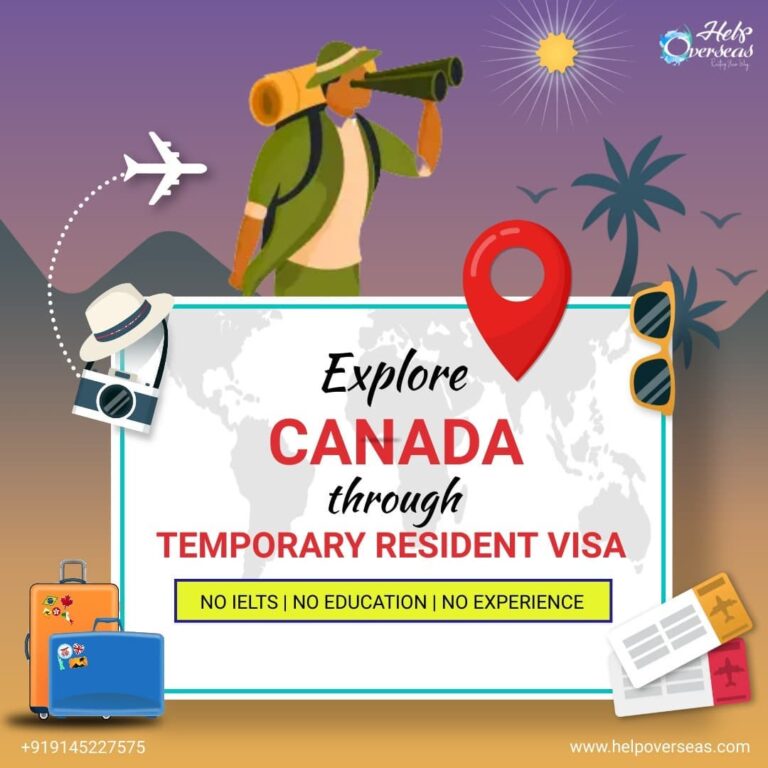TEMPORARY RESIDENT VISA (TRV) CANADA
What is a Temporary Residency Visa (TRV)
A temporary Resident Visa (TRV), referred to as Visitor Visa, is issued by the Canadian Government to those who wish to visit Canada or reside in their country for a short duration of time, up to 6 months.
A Canadian Temporary Resident Visa (TRV) is granted by a Canadian visa office. The Visa establishes that you have met the requirements for admission to Canada as a visitor, a student, or a temporary worker. A temporary Resident Visa (TRV) does not guarantee your admission to the country.
Aspects such as the time of your application for a temporary resident visa and your arrival in Canada or additional information available could still result in you being refused entry. A Temporary Resident Visa (TRV), also referred to as a visitor visa, is an official document issued by a Canadian visa office that is placed in your passport to show that you have met the requirements for admission to Canada as a Temporary Resident (either as a visitor, a student, or a worker).
Visitors is a name given to a group of people who aren’t Canadian citizens or permanent residents of Canada and have been legally authorized to enter Canada to visit the country on a holiday (vacation), visit the family, conduct business, etc. It restricts visitors in the duration of their stay and is subject to various conditions.
People who are not Canadian citizens or permanent residents of Canada may require a visa to enter the country. The requirement for the same also applies to temporary residents who want to transit in Canada. If a person does not require a visa to enter Canada, he/she may require an Electronic Travel Authorization (eTA). The Temporary Resident Visa application process is very simple. It doesn’t require IELTS, education, or work experience.

Eligibility criteria for Temporary Resident Visa (TRV):
- Age must be at least 18 years to apply as the primary visa applicant.
- Must not have any health issues.
- Have a valid passport with at least one blank page that is not the last page of the passport.
- Must not have any criminal history.
- Prepare to pay the appropriate visa application and processing fees.
- Make sure you have enough money to get around Canada.
- Prepare for an interview or a meeting.
- Prove that your visit to Canada is only temporary and that you will return to your native country when it is finished.
- You must prove that you have no intention of working or studying in Canada.
- Fill and sign a Visa Application Center (VAC) Consent Form.
- Persuade an immigration officer that you have ties to your native country, such as a job, residence, financial assets, or family.
Who can apply for Temporary Resident Visa (TRV)
Visitors from foreign countries require a Temporary Resident visa to either visit or transit Canada. For a temporary resident visa, one must apply before leaving; as afterward, you won’t be able to get one once you enter Canada. The Temporary Resident Visa validity is about 6 months.
Types of Temporary Resident Visas (TRV)
There are three types of Temporary Resident Visas (TRV) for Canada:
- Single entry visa—allows you to enter Canada just once. It can also be used for repeated entries from the United States or Saint-Pierre and Miquelon during the time validated for your stay in Canada as long as you do not enter another country. A single-entry visa is normally valid for six months.
- Multiple entry visa—allows you to enter Canada as many times as you wish for the time validated of your stay in Canada.
- Transit visa—required when you will be in Canada for 48 hours or less on your way to another country.
Eligibility criteria for Temporary Resident Visa (TRV)
- Age must be at least 18 years to apply as the primary visa applicant.
- Have a valid passport with at least one blank page that is not the last page of the passport.
- Must not have any criminal history.
- Prepare to pay the appropriate visa application and processing fees.
- Fill and sign a Visa Application Center (VAC) Consent Form.
- Make sure you have enough money to get around Canada.
- Prepare for an interview or a meeting.
- Prove that your visit to Canada is only temporary and that you will return to your native country when it is finished.
- You must prove that you have no intention of working or studying in Canada.
FAQ
- visit Canada on holiday (vacation),
- visit family,
- conduct business, etc.
Persons who are not Canadian citizens or permanent residents of Canada may require a visa to enter Canada. The requirement for a visa also applies to temporary residents who are transiting in Canada. Contact Helpoverseas Immigration to find out if you need an Electronic Travel Authorization (ETA) or a visitor visa.
If you do not require a visa to enter Canada, you may require an Electronic Travel Authorization (ETA). Find out if you need an ETA.
A Temporary Resident Visa (TRV), also referred to as a visitor visa, is an official document issued by a Canadian visa office that is placed in your passport to show that you have met the requirements for admission to Canada as a temporary resident (either as a visitor, a student, or a worker).
 Important information: You must obtain a Temporary Resident Visa (TRV) before your departure. You cannot obtain one upon arrival in Canada.
Important information: You must obtain a Temporary Resident Visa (TRV) before your departure. You cannot obtain one upon arrival in Canada.
You must show the officer that you meet the requirements of the Immigration and Refugee Protection Act (IRPA) and the Immigration and Refugee Protection Regulations and that you will be in Canada for a temporary stay.
You must also:
Convince the officer that you will leave Canada at the end of your stay, show that you have enough money to maintain yourself and your family members in Canada and to return home, not intend to work or study in Canada unless authorized to do so, be law-abiding and have no record of criminal activity, not be a risk to the security of Canada, provide any additional document requested by the officer to establish your admissibility, and be in good health (complete a medical examination if required).
Looking for Canada Immigration? Join Us Now!
Temporary Resident Visa
What is a Temporary Residency Visa (TRV)
Canada welcomes millions of temporary visitors annually.
If you are not a Canadian citizen, permanent resident, or from a visa-exempt country, you will need to apply for a Temporary Resident Visa (TRV) to visit Canada temporarily as a tourist, temporary worker, or international student.
A TRV is issued by a Canadian Immigration Visa Office and indicates that you meet the entry requirements for Canada as a visitor. However, possessing a TRV does not guarantee entry or temporary resident status in Canada

Eligibility criteria for Temporary Resident Visa (TRV):
- Age must be at least 18 years to apply as the primary visa applicant.
- Must not have any health issues.
- Have a valid passport with at least one blank page that is not the last page of the passport.
- Must not have any criminal history.
- Prepare to pay the appropriate visa application and processing fees.
- Make sure you have enough money to get around Canada.
- Prepare for an interview or a meeting.
- Prove that your visit to Canada is only temporary and that you will return to your native country when it is finished.
- You must prove that you have no intention of working or studying in Canada.
- Fill and sign a Visa Application Center (VAC) Consent Form.
- Persuade an immigration officer that you have ties to your native country, such as a job, residence, financial assets, or family.
Temporary Resident Visa Requirements)
To apply for a TRV, you must complete forms from Immigration, Refugees, and Citizenship Canada (IRCC). Along with these forms, you need to:
- Pay the required processing and biometric collection fees.
- Submit the necessary supporting documents with your application.
The documents you might need include:
- Passport photos
- Proof of financial support
- A photocopy of your return ticket or travel itinerary (if applicable)
The specific documents required can vary depending on the visa office responsible for your country or region.
Temporary Resident Visa Validity
If your passport does not have a stamp, date, or document indicating an expiry date, your status as a temporary resident in Canada will automatically expire six months from the date of your arrival.
Multiple-Entry Visa vs Single-Entry Visa
The Multiple-Entry Visa permits the holder to enter Canada from any country as often as needed during its validity period. This TRV is generally issued with long-term validity to facilitate entry for legitimate travelers. The Multiple-Entry Visa can be valid for up to 10 years or until one month before the expiry date on the travel document.
Conversely, a Single-Entry Visa is issued when an applicant is participating in a one-time special event in Canada for a short duration. As the standard is the Multiple-Entry Visa, an immigration officer must explain the decision if a Single-Entry Visa is granted.
Studying In Canada On A Temporary Resident Visa
Generally, international students must apply for a Canada Study Visa to undertake an educational program. However, if your program is less than six months, a study permit is not required. For programs longer than six months, you must apply to a Designated Learning Institution (DLI) in Canada. Once admitted, you will need to apply for a study permit to continue your studies.
Working In Canada On A Temporary Resident Visa
Generally, foreign nationals need a work permit to work in Canada. If you currently hold valid temporary resident status, you can apply for a work permit. While awaiting a decision on your application, it’s common to extend your stay in Canada, effectively remaining in the country under “maintained status” until a decision is made.
Spousal Sponsorship and Temporary Resident Visa
Family members or spouses from visa-required countries, who have applied for permanent residency through the Family Sponsorship Program, can seek a Temporary Resident Visa (TRV) to join their sponsor in Canada. Immigration, Refugees and Citizenship Canada (IRCC) has implemented a new approach for spousal TRV applications, achieving over 98% approval rates for spouses and their children. This allows families to be together while waiting for their permanent residency applications to be processed. According to IRCC, the processing time for spousal TRVs is expected to be 30 days.
Extending Your Stay In Canada
You can extend your temporary resident status in Canada either online or by using a paper application. It is advisable to submit your application at least 30 days before your current status expires. If your temporary resident status expires after you have submitted the extension application but before a decision is made, you are allowed to stay in Canada under “maintained status” until a decision on your application is made.
Can I enter Canada with a TRV and eventually apply for permanent residence?
Dual intent refers to a foreign national who, while applying or considering applying for a Canada PR visa, also plans to enter the country temporarily as a visitor, student, or worker. While having dual intent is acceptable, the potential approval for permanent residence doesn’t exempt you from meeting the requirements of a temporary resident, particularly the obligation to depart Canada when your authorized stay ends.

